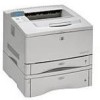HP 5100tn Printer Job Language - Technical Reference Manual - Page 143
Status Category, Description
 |
View all HP 5100tn manuals
Add to My Manuals
Save this manual to your list of manuals |
Page 143 highlights
Note For those printers supporting Japanese printing, when the language is set to Japanese, strings which correspond to a control panel message are displayed on the control panel using the JIS X0201-76 character set. Status Category Description 10 Informational messages which do not indicate errors, such as (10-000 to 10-999) "Device was put online and is ready" or "device was put offline." 11 (11-000 to 11-999) These messages indicate background paper mount messages, which means one of the available paper input sources is empty, but another paper source is available and loaded with the correct paper size. The printer remains online during background paper mount conditions. 12 Messages indicating background paper tray status, such as "tray (12-000 to 12-999) open" or "tray lifting". The printer remains online during background paper tray status conditions. 15 These messages indicate output bin status, such as "output bin full." (15-000 to 15-999) The printer goes offline when the output bin is full. 20 This type of message denotes a PJL parser error. When this type of (20-000 to 20-999) error occurs, the entire command line is ignored. 25 These messages are PJL parser errors. When this type of message (25-000 to 25-999) occurs, only part of the PJL command is ignored, instead of the whole command as happens with 20-xxx errors. 27 (27-000 to 27-999) These messages are PJL semantic errors, indicating the command syntax is acceptable, but command execution is not possible for some reason. A situation that produces a semantic error is trying to lock a paper tray when all other paper trays are already locked. 30 (30-000 to 30-999) Most conditions in this category are auto-continuable, indicating that if no operator action is taken, the printer automatically continues if the auto-continue feature is set to true; if auto-continue is set to false, the printer waits until an operator presses either the Continue or On Line key. Examples of these errors include non-fatal I/O errors or when a page is ejected because it is too complex to format without the page protection feature enabled. Status Readback Commands 7-35















